Here are some events that happened on May 29th. It could be an event or a person that died or was born on that day
1691 Died: Cornelis Tromp, Dutch admiral (b. 1629)
Cornelis Maartenszoon Tromp (3 September 1629 – 29 May 1691) was a Dutch naval officer who served as lieutenant-admiral general in the Dutch Navy, and briefly as a general admiral in the Royal Danish Navy. Tromp fought in the Anglo-Dutch Wars and the Scanian War. His father was Lieutenant Admiral Maarten Tromp.
Tromp was a very aggressive squadron commander who personally relished the fight, preferring the direct attack having the weather gage over line-of-battle tactics. As a result, he had to change ships often: four times at the Four Days' Battle, three times at Schooneveld and two times at Texel. He was popular with his crews, despite the danger he put them in, because of his easy-going manners and his supporting the cause of the House of Orange against the States regime of Johan de Witt. However, he often treated his fellow officers with contempt, both his equals and superiors.
Tromp is infamous for his insubordination, although the two examples most often mentioned in this context, not following De Ruyter on the second day of the Four Days' Battle and chasing the English rear in the St James's Day Fight, seem to have been honest mistakes. He was very jealous of De Ruyter but generally treated him with respect, though he considered him too common. Tromp tried to imitate the lifestyle of the nobility, marrying a rich elderly widow, Margaretha van Raephorst, in 1667. He had no children. At home, without fighting to distract him, Cornelis, or Kees as he was normally called, grew quickly bored and indolent. He had the reputation of being a heavy drinker, so much so that many inns at the time were named after him.
Tromp was a vain man, having an extremely high opinion of himself, which he never hesitated in sharing with others. He felt that, son of a famous father, he had a natural right to the position of naval hero. During his life he posed as a sitter for at least 22 paintings, a record for the 17th century, many by top artists such as Ferdinand Bol. His art possessions were displayed in his estate, that long after his death was called 'Trompenburgh', the manor house built in the form of a warship.
As his wider family was among the most fanatical supporters of Orange, he participated in most of their schemes, especially those of his brother-in-law Johan Kievit, a shrewd and unscrupulous intriguer. Tromp however had no great enthusiasm for subtle plotting; later in life he came to regret many of his actions. He died in great mental anguish, convinced he would go to hell as punishment for his crimes.
Dutch stamp depicting Cornelis Tromp
1790 – Rhode Island becomes the last of North America's original Thirteen Colonies to ratify the Constitution and become one of the United States.
Rhode Island, officially the State of Rhode Island, is a state in the New England region of the United States. It is the smallest U.S. state by area and the seventh-least populous (1,098,163 according to the 2020 census), but it is also the second-most densely populated behind New Jersey. The state takes its name from Rhode Island; however, most of the state is located on the mainland. The state has land borders with Connecticut to the west, Massachusetts to the north and east, and the Atlantic Ocean to the south via Rhode Island Sound and Block Island Sound. It also shares a small maritime border with New York. Providence is the state capital and most populous city in Rhode Island.
On May 4, 1776, the Colony of Rhode Island and Providence Plantations was the first of the Thirteen Colonies to renounce its allegiance to the British Crown, and it was the fourth state to ratify the Articles of Confederation, doing so on February 9, 1778. The state boycotted the 1787 convention, which drew up the United States Constitution and initially refused to ratify it; it was the last of the original 13 states to do so, on May 29, 1790.
Formerly named the State of Rhode Island and Providence Plantations since its accession to the Union in 1790, voters in the state approved an amendment in November 2020 to the state constitution, renaming itself the State of Rhode Island. This change took effect when the results were certified on November 30, 2020. Rhode Island's official nickname is the "Ocean State", a reference to the large bays and inlets that amount to about 14% of its total area.
US Rhode Island Statehood Bicentennial stamp
1848 – Wisconsin is admitted as the 30th U.S. state.
Wisconsin is a state in the upper Midwestern United States, bordered by Minnesota to the west; Iowa to the southwest; Illinois to the south; Lake Michigan to the east; Michigan to the northeast; and Lake Superior to the north. Wisconsin is the 23rd-largest state by total area and the 20th-most populous.
Milwaukee, its largest city, sits on the western shore of Lake Michigan. The state capital, Madison, is currently the second most populated and fastest growing city in the state. Green Bay and Kenosha, the third and fourth most populated Wisconsin cities respectively, also sit on the western shores of Lake Michigan. The state is divided into 72 counties.
Wisconsin's geography is diverse, having been greatly impacted by glaciers during the Ice Age with the exception of the Driftless Area. The Northern Highland and Western Upland along with a part of the Central Plain occupies the western part of the state, with lowlands stretching to the shore of Lake Michigan. Wisconsin is third to Ontario and Michigan in the length of its Great Lakes coastline.
At the time of European contact, the area that is now Wisconsin was inhabited by Algonquian and Siouan nations. During the 19th and early 20th centuries, many European settlers entered the state, many of whom emigrated from Germany and Scandinavia. Like neighboring Minnesota, the state remains a center of German American and Scandinavian American culture. The state is one of the nation's leading dairy producers and is known as "America's Dairyland"; it is particularly famous for its cheese. The state is also famous for its beer, particularly and historically in Milwaukee. Manufacturing (especially paper products), information technology, cranberries, ginseng, and tourism are also major contributors to the state's economy.
US Wisconsin Statehood stamps
1864 – Emperor Maximilian I of Mexico arrives in Mexico for the first time.
Maximilian I (Spanish: Fernando Maximiliano José María de Habsburgo-Lorena; 6 July 1832 – 19 June 1867) was the only monarch of the Second Mexican Empire. He was a younger brother of the Austrian emperor Franz Joseph I. After a distinguished career in the Austrian Navy as its commander, he accepted an offer by Napoleon III of France to rule Mexico, conditional on a national plebiscite in his favour.
Below are some Mexican stamps depicting Maximilian I
1917 Born: John F. Kennedy, 35th President of the United States (d. 1963)
John Fitzgerald Kennedy (May 29, 1917 – November 22, 1963), often referred to by his initials JFK and Jack, was an American politician who served as the 35th president of the United States from January 1961 until his assassination in November 1963. Kennedy served at the height of the Cold War, and the majority of his work as president concerned relations with the Soviet Union and Cuba. A Democrat, Kennedy represented Massachusetts in the U.S. House of Representatives and Senate prior to becoming president.
Kennedy was born into a wealthy, political family in Brookline, Massachusetts. He graduated from Harvard University in 1940, before joining the U.S. Naval Reserve the following year. During World War II, he commanded a series of PT boats in the Pacific theater and earned the Navy and Marine Corps Medal for his service. After a brief stint in journalism, Kennedy represented a working-class Boston district in the U.S. House of Representatives from 1947 to 1953. He was subsequently elected to the U.S. Senate and served as the junior Senator from Massachusetts from 1953 to 1960. While in the Senate, Kennedy published his book, Profiles in Courage, which won a Pulitzer Prize. In the 1960 presidential election, he narrowly defeated Republican opponent Richard Nixon, who was the incumbent vice president.
Kennedy's administration included high tensions with communist states in the Cold War. As a result, he increased the number of American military advisers in South Vietnam. In April 1961, he authorized an attempt to overthrow the Cuban government of Fidel Castro in the Bay of Pigs Invasion. Kennedy authorized the Cuban Project in November 1961. He rejected Operation Northwoods (plans for false flag attacks to gain approval for a war against Cuba) in March 1962. However, his administration continued to plan for an invasion of Cuba in the summer of 1962. The following October, U.S. spy planes discovered Soviet missile bases had been deployed in Cuba; the resulting period of tensions, termed the Cuban Missile Crisis, nearly resulted in the breakout of a global thermonuclear conflict. The Strategic Hamlet Program began in Vietnam during his presidency. Domestically, Kennedy presided over the establishment of the Peace Corps and the continuation of the Apollo space program. He also supported the civil rights movement, but was only somewhat successful in passing his New Frontier domestic policies.
On November 22, 1963, he was assassinated in Dallas. Vice President Lyndon B. Johnson assumed the presidency upon Kennedy's death. Marxist and former U.S. Marine Lee Harvey Oswald was arrested for the state crime, but he was shot and killed by Jack Ruby two days later. The FBI and the Warren Commission both concluded Oswald had acted alone in the assassination, but various groups contested the Warren Report and believed that Kennedy was the victim of a conspiracy. After Kennedy's death, Congress enacted many of his proposals, including the Civil Rights Act and the Revenue Act of 1964. Kennedy ranks highly in polls of U.S. presidents with historians and the general public. His personal life has also been the focus of considerable sustained interest following public revelations in the 1970s of his chronic health ailments and extramarital affairs.
Stamps from the US, German and Monaco depicting John F. Kennedy
1919 – Albert Einstein's theory of general relativity is tested (later confirmed) by Arthur Eddington and Andrew Claude de la Cherois Crommelin
Albert Einstein (14 March 1879 – 18 April 1955) was a German-born theoretical physicist who developed the theory of relativity, one of the two pillars of modern physics (alongside quantum mechanics). His work is also known for its influence on the philosophy of science. He is best known to the general public for his mass–energy equivalence formula E = mc2, which has been dubbed "the world's most famous equation". He received the 1921 Nobel Prize in Physics "for his services to theoretical physics, and especially for his discovery of the law of the photoelectric effect", a pivotal step in the development of quantum theory.
The son of a salesman who later operated an electrochemical factory, Einstein was born in the German Empire but moved to Switzerland in 1895 and renounced his German citizenship in 1896. Specializing in physics and mathematics, he received his academic teaching diploma from the Swiss Federal Polytechnic School (German: eidgenössische polytechnische Schule) in Zürich in 1900. The following year, he acquired Swiss citizenship, which he kept for his entire life. After initially struggling to find work, from 1902 to 1909 he was employed as a patent examiner at the Swiss Patent Office in Bern.
Near the beginning of his career, Einstein thought that Newtonian mechanics was no longer enough to reconcile the laws of classical mechanics with the laws of the electromagnetic field. This led him to develop his special theory of relativity during his time at the Swiss Patent Office. In 1905, called his annus mirabilis (miracle year), he published four groundbreaking papers, which attracted the attention of the academic world; the first outlined the theory of the photoelectric effect, the second paper explained Brownian motion, the third paper introduced special relativity, and the fourth mass-energy equivalence. That year, at the age of 26, he was awarded a PhD by the University of Zurich.
Although initially treated with skepticism from many in the scientific community, Einstein's works gradually came to be recognised as significant advancements. He was invited to teach theoretical physics at the University of Bern in 1908 and the following year moved to the University of Zurich, then in 1911 to Charles University in Prague before returning to ETH (the newly renamed Federal Polytechnic School) in Zürich in 1912. In 1914, he was elected to the Prussian Academy of Sciences in Berlin, where he remained for 19 years. Soon after publishing his work on special relativity, Einstein began working to extend the theory to gravitational fields; he then published a paper on general relativity in 1916, introducing his theory of gravitation. He continued to deal with problems of statistical mechanics and quantum theory, which led to his explanations of particle theory and the motion of molecules. He also investigated the thermal properties of light and the quantum theory of radiation, the basis of the laser, which laid the foundation of the photon theory of light. In 1917, he applied the general theory of relativity to model the structure of the universe.
In 1933, while Einstein was visiting the United States, Adolf Hitler came to power. Because of his Jewish background, Einstein did not return to Germany. He settled in the United States and became an American citizen in 1940. On the eve of World War II, he endorsed a letter to President Franklin D. Roosevelt alerting FDR to the potential development of "extremely powerful bombs of a new type" and recommending that the US begin similar research. This eventually led to the Manhattan Project. Einstein supported the Allies, but he generally denounced the idea of using nuclear fission as a weapon. He signed the Russell–Einstein Manifesto with British philosopher Bertrand Russell, which highlighted the danger of nuclear weapons. He was affiliated with the Institute for Advanced Study in Princeton, New Jersey, until his death in 1955.
He published more than 300 scientific papers and more than 150 non-scientific works. His intellectual achievements and originality have made the word "Einstein" synonymous with "genius". Eugene Wigner compared him to his contemporaries, writing that "Einstein's understanding was deeper even than Jancsi von Neumann's. His mind was both more penetrating and more original".
Stamps from various countries depicting Albert Einstein


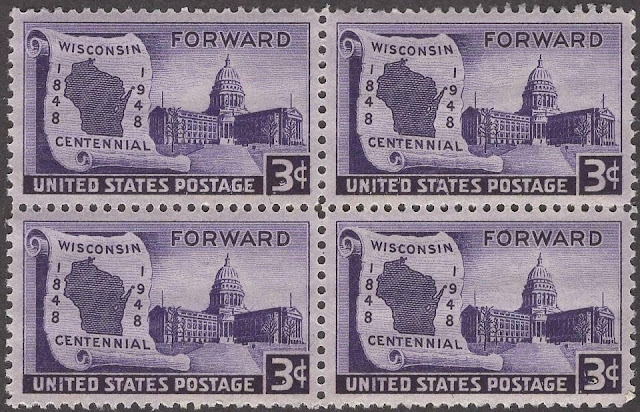
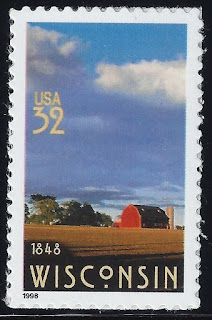

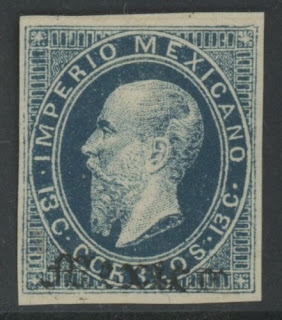

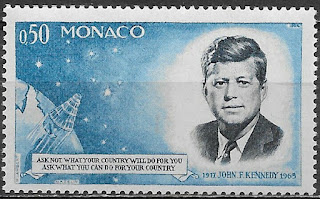


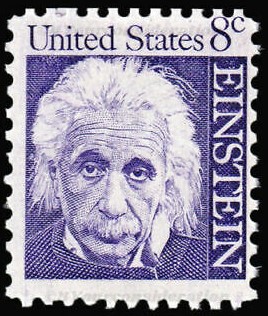


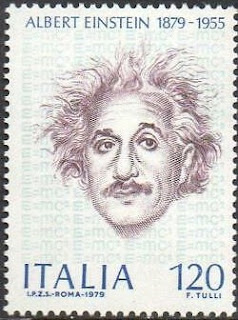
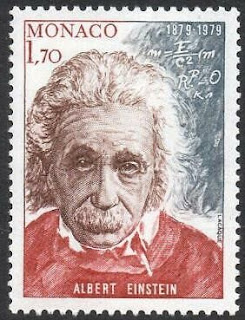

No comments:
Post a Comment